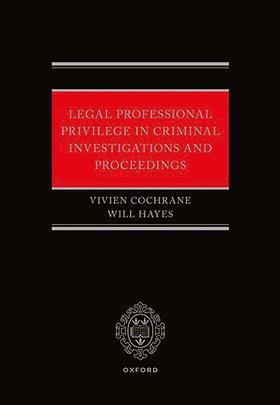Legal Professional Privilege in Criminal Investigations and Proceedings
Vivien Cochrane and Will Hayes
£95, Oxford University Press
★★★★★
I suspect that many, if not most, criminal practitioners are not as familiar with the principles of legal professional privilege (LPP) as they would like to think they are. This is despite the fact that it is the absolute protection that allows us to take instructions, advise clients and structure their cases. Although LPP is, in Lord Hoffmann’s words, ‘a fundamental human right long established in the common law’, criminal lawyers often only grapple with the complexities of case law when an urgent issue arises. And, as Professor Ormerod points out in his foreword to this work, LPP has generated less practical legal scholarship than other areas of criminal evidence.
Vivien Cochrane and Will Hayes’ excellent book is therefore a welcome contribution, providing clear, practical and accessible guidance on the issues that come into play in the criminal process.
This user-friendly book starts with an overview of the general principles around LPP, including the crime-fraud exception. It goes on to consider the key issues that can arise from the initial stage of a criminal investigation, at the point of search, seizure and surveillance, through to interviews under caution and to trial and appeal. The duties of both defence and prosecution lawyers (and investigators) are addressed throughout.

Defence practitioners will welcome the comprehensive but clearly structured sections on waiver. These fully cover the most commonly encountered scenarios, particularly around police station advice and section 34 CJPOA adverse inferences, instructions to experts, and issues arising from appellant obligations under McCook. The final chapter on internal investigations guides the reader through the complexities of advising corporate clients. It also looks at the difficult balance that often has to be struck between protecting privilege versus cooperation with investigating authorities. The section on privilege reviews will assist defence, prosecution and independent reviewers alike. Throughout the book, the authors acknowledge the legal and logistical challenges posed by the sheer quantity of digital data that modern criminal investigations generate.
The leading authorities on LPP are often not criminal cases and are sometimes complex, particularly those involving multiple parties and multiple litigation. Here they are presented logically and succinctly, the more difficult concepts made accessible. Where the authorities diverge or contain inconsistencies, the authors offer authoritative opinions of their own.
For most practitioners, particularly those who defend, it is the risk of inadvertent waiver that is usually their main concern. The primary objective test applied in assessing waiver can be unforgiving. I imagine that, when reminded that seemingly innocuous wording such as ‘I entered into the contract as a result of that legal advice’ would amount to a waiver of privilege, even the most experienced lawyers may pause for thought.
This book should be essential reading for criminal lawyers.
Martin Rackstraw is a partner at Russell-Cooke LLP, specialising in criminal defence































No comments yet